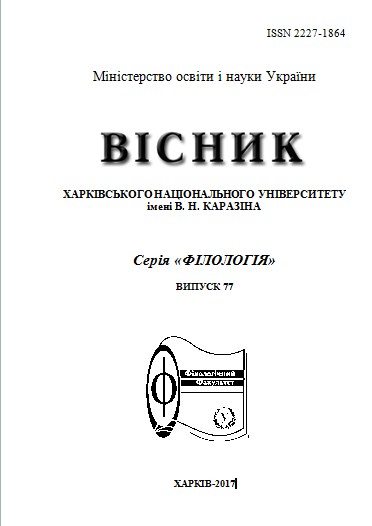Stranger word of an another`s world: the problem of the power of discourse in Pelevin`s novel “T”
Abstract
Present article deals with the study of the power of discourse, which means consciousness’ dependence on some ideological discourse structures. We have found that world perception and self-awareness of the character are constructed by demiurges, creators of postmodern literary fiction. Postmodern study represents a mosaic picture of the world and gives a blend of contexts and discourses, but the most prevalent and pervasive forms of institutionalized speech are religious, philisophycal, criminal and ordinary that is related to the conception of the book. Every creator transmits his own ideological meanings in a rigid orderly system of modern writing. The analysis showed that postmodern prose is a sphere of poly-discoursivity, which is expressed mainly through impact and interaction of several different discourses, among which it is impossible to single out the discourse-donor and discourse-recipient. Meta-discoursivity is shown in its relation to the poly-discoursivity. It is said that reflection over the utterance gives the possibility to get rid from the authority of someone`s discourse. Much attention is given to problem of mosaic picture of the world in its connection with the divided person’s consciousness.
Downloads
References
2. «Вдали от комплексных идей живешь, как Рэмбо, – day by day» : [интервью с писателем В. Пелевиным / записала Л. Новикова] [Электронный ресурс] // Коммерсантъ. – 2003. – № 157. – С. 14. – Режим доступа : http: //kommersant.ru/doc/408159.
3. Ильин И. П. Постмодернизм: словарь терминов / И. П. Ильин. – М. : ИНИОН РАН – INTRADA, 2001. – 384 с.
4. Квадратура смысла : Французская школа анализа дискурса : пер. с фр. и португ. / Общ. ред. и вступ. ст. П. Серио; предисл. Ю. С. Степанова. – М. : ОАО ИГ «Прогресс», 1999. – 416 с.
5. Михайлов В. А. Особенности развития информационно-коммуникативной среды современного общества / В. А. Михайлова, С. В. Михайлов // Актуальные проблемы теории коммуникации: сб. науч. тр. – СПб. : Изд-во СПбГПУ, 2004. – С. 34–52.
6. Моль А. Социодинамика культуры / А. Моль; [пер с фр.; вступ. ст., ред. и прим. Б. В. Бирюкова, Р. Х. Зарипова и С. Н.Плотникова]. – [3-е изд.]. – М. : Изд-во ЛКИ, 2008. – 416 с.
7. Олизько Н. С. Семиотико-синергетическая интерпретация особенностей реализации категорий интертекстуальности и интердискурсивности в постмодернистском художественном дискурсе: дис. … доктора филол. наук: 10.02.19 / Н. С. Олизько. – Челябинск, 2009. – 343 с.
8. Пелевин В. t: [роман] / В. Пелевин. – СПб. : Азбука, Азбука-Аттикус, 2016. – 416 с.
9. Смит Н. Современные системы психологии: история, постулаты, практика / Н. Смит; [пер. с англ.; под общ. ред. А. А. Алексеева]. – СПб. : прайм-ЕВРОЗНАК, 2003. – 384 с.
10. Степанов А. Ишь, навертел! [Электронный ресурс] / А. Степанов // Прочтение. – Режим доступа : http: // prochtenie.ru/index.php/docs/3367.
11. Филипс Л. Дискурс-анализ. Теория и метод. / Л. Филипс, М. В. Йоргенсен; [пер с англ.] – Х. : Изд-во «Гуманитарный Центр», 2008. – 352 с.
12. Чернявская В. Е. Дискурс власти и власть дискурса : проблемы речевого воздействия : [учеб. пособ.] / В. Е. Чернявская. – М. : Флинта : Наука, 2006. – 136 с.




